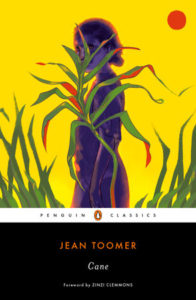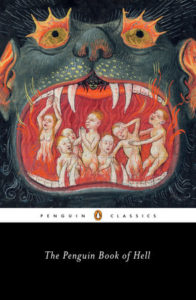
After a fortnight of holiday hibernation, the country’s book reviewers are back at their desks and ready to melt a path though the snow drifts of ignorance with their flamin’ hot takes. Before we walk boldly into 2019 alongside them, however, we thought we’d take a look back at some of the best criticism of the past couple of weeks—a period when noisy Best Of and End of Year lists tend to drown out the measured voice of the humble individual review.
In her fascinating New York Times essay on Jean Toomer’s Cane (reissued this month from Penguin Classics), Parul Sehgal calls the slim-but-powerful classic “oracular, delirious and American—rich with the intensities of Melville, the expansiveness of Whitman and Toomer’s own bedeviling preoccupation with color.”
Over at the New York Review of Books, Shakespeare scholar Stephen Greenblatt finds himself considering the afterlives of history’s greatest monsters as he peruses The Penguin Book of Hell, “an anthology of sadistic fantasies that for millions of people over many centuries laid a claim to sober truth.”
Meanwhile, back in the book pages of the Grey Lady, Jamie Fisher, having read Joyce Carol Oates’ Hazards of Time Travel, wonders whether Oates is attempting to become Margaret Atwood: “The violence of Oates’s world is excessive, but then again it looks much like our own … So if the country in Hazards of Time Travel looks a lot like Gilead, that may be the fault of America and not Atwood.”
We also take a closer look at Mark O’Connell’s robust defense of Milkman, Anna Burns’ Booker Prize-winning novel of Northern Ireland during the Troubles (“Like Flann O’Brien and Samuel Beckett…Burns understands the rich comic potential of trying the reader’s patience”), and Ron Charles’ assessment of The Day the Sun Died, Yan Lianke’s hypnotic, jet-black social comedy (“the creepiest book I’ve read in years”).
*

“He is American literature’s greatest, most enduring enigma. In 1923, Jean Toomer—highborn but an orphan and a drifter, a young man with secrets—published the single, slender novel upon which his reputation rests. In bursts of poetry and prose, Cane tells of black life in the lethal rural South and in the loveless cities of the North. The narration has a kind of cosmic consciousness, entering the world of the characters, the whispering pine trees, the falling dusk, the soil. It is oracular, delirious and American—rich with the intensities of Melville, the expansiveness of Whitman and Toomer’s own bedeviling preoccupation with color … Cane sold modestly but exerted a powerful influence over the Harlem Renaissance; it was, according to the sociologist Charles S. Johnson, ‘the most astonishingly brilliant beginning of any Negro writer of his generation.’ And then Toomer disappeared, never to publish another book … Toomer’s personal impulses would run to experiments with racial definition and communal living. But here, in this lush, bleak book, in his evocation of the world as it is instead of how it ought to be, something hardier, more useful is conveyed—of the possibilities for epiphany, the reliable consolations of love and revenge. And in his style—this pastiche of poem, autobiography and fable—there is an integration of the self that the life never afforded.”
–Parul Sehgal on Jean Toomer’s Cane (The New York Times)
*
“Yan Lianke’s mordant novels are effectively banned in China, and his vision of social decay and commercial exploitation is so relevant to life in the United States that we may have to ban them here, too. There is, after all, only so much insight we can tolerate … It’s the creepiest book I’ve read in years: a social comedy that bleeds like a zombie apocalypse … an artfully organized, minute-by-minute description of ‘the great somnambulism,’ a horrific night of sleepwalking … A macabre subplot pushes this theme even further into the realm of the grotesque that stretches from Jonathan Swift to Nana Kwame Adjei-Brenyah … I can’t emphasize enough the sheer weirdness of this story. Although we never see the sleeping visions that torment Yan’s characters, we move with Li through the viscous atmosphere of dreams. Before long, we’re hypnotized by the warped logic of nightmares … Yan’s understated wit runs through these pages like a snake through fallen leaves, but if you don’t appreciate the harmonic repetitions of his narrative, it will seem maddeningly dull. And if you insist on traditional character development, you will be completely disappointed. You either fall under this incantation, or you break away in frustration … a wake-up call about the path we’re on.”
–Ron Charles on Yan Lianke’s The Day the Sun Died (The Washington Post)
*
“This might sound like a perverse strategy of willful obscurantism, but in fact Milkman’s formal strangeness proceeds naturally from the strangeness of the story it tells and the place in which it is set. In Northern Ireland during the worst years of the Troubles, proper nouns were like suspect devices: charged with violent potential, and to be treated with extreme caution … For all the simplicity of its setup, Milkman is a richly complex portrayal of a besieged community and its traumatized citizens, of lives lived within many concentric circles of oppression … Among Burns’ singular strengths as a writer is her ability to address the topics of trauma and tyranny with a playfulness that somehow never diminishes the sense of her absolute seriousness … Like Flann O’Brien and Samuel Beckett, two writers with whom she has more than Irishness in common, Burns understands the rich comic potential of trying the reader’s patience, and of lists and enumerations as a means of illuminating the absurdity of logical rigor, of language itself … The book’s long sentences, its penchant for the exhaustive, can at times be challenging, and there were stretches where I found its uncanny energies stagnated for too long. But it also seems clear to me that these insistent strategies are in service of the book’s mood of total claustrophobia, and that they contribute to, rather than diminish, its overall effectiveness … There is a pulsating menace at the heart of the book, of which the title character is an uncannily indeterminate avatar, but also a deep sadness at the human cost of conflict … For all the darkness of the world it illuminates, Milkman is as strange and variegated and brilliant as a northern sunset. You just have to turn your face toward it, and give it your full attention.”
–Mark O’Connell on Anna Burns’ Milkman (Slate)
*

“The Penguin Book of Hell is an anthology of sadistic fantasies that for millions of people over many centuries laid a claim to sober truth … I force myself to think of the worst monsters in world history—Hitler immediately comes to mind—and try to consign them to this imaginary penal colony, but I cannot do it. The problem is not tenderness on my part—an impulse to forgive and forget or a hope for the criminal’s repentance and rehabilitation—but an inability to enter into a metaphysical system ruled by an omnipotent creator whose endless love is shadowed by an endless rage … Dante’s stupendous poetic achievement is too rich and complex to fit comfortably into The Penguin Book of Hell. In its deep human sympathy, the Inferno resists functioning as a piece of doctrine or grim pedagogy, and the few excerpts that the editor includes seem out of place among the cruder fantasies and dire warnings that dominate the anthology … One of the prime motives of these texts is rage, rage against people occupying positions of exceptional trust and power who lie and cheat and trample on the most basic values and yet who escape the punishment they so manifestly deserve. History is an unending chronicle of such knaves, and it is a chronicle too of frustration and impotence, certainly among the mass of ordinary people but even among those who feel that they are stakeholders in the system. Hell is the last recourse of political impotence. You console yourself—you manage to stay asleep, as Freud might say—by imagining that the loathsome characters you detest will meet their comeuppance in the afterlife.”
–Stephen Greenblatt on The Penguin Book of Hell, ed. by Scott G. Bruce (The New York Review of Books)
*
“Increasingly I wonder whether Joyce Carol Oates is attempting to become Margaret Atwood. Her 40-odd novels, traced over the past 50-odd years, mark an increasing tendency toward dystopia. She is most famous for what one might call novels of small-scale violence, in which individuals might get bloodied (or kidnapped, or sacrificially killed, or implicated in a murder-suicide) but societies usually get off scot-free. Now she has written a thriller in which the murder victim is America. The violence of Oates’s world is excessive, but then again it looks much like our own. Like other prolific authors, Oates has always plucked characters and plot-points from the real world: Jeffrey Dahmer, JonBenet Ramsey, Marilyn Monroe. Oates has a tendency to broadcast the threats that are fashionable, not necessarily the ones most likely to befall us. She makes distorted photocopies of the American psyche: biker gangs, psychotic mothers, amnesiacs, cults, sexual abuse, race riots, serial killers, strippers who are also serial killers. So if the country in Hazards of Time Travel looks a lot like Gilead, that may be the fault of America and not Atwood.”
–Jamie Fisher on Joyce Carol Oates’ Hazards of Time Travel (The New York Times Book Review)

